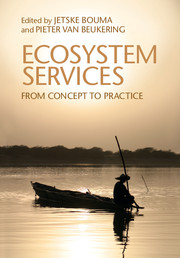Book contents
- Frontmatter
- Contents
- About the authors
- Part I Introduction
- Part II Measuring ecosystem services
- Part III Valuing ecosystem services
- 5 Economic values of ecosystem services
- 6 Economic valuation methods for ecosystem services
- 7 Trade-offs and decision-support tools for managing ecosystem services
- Part IV Paying for ecosystem services
- Part V Governing ecosystem services
- Index
- Plate section
- References
7 - Trade-offs and decision-support tools for managing ecosystem services
from Part III - Valuing ecosystem services
Published online by Cambridge University Press: 05 February 2015
- Frontmatter
- Contents
- About the authors
- Part I Introduction
- Part II Measuring ecosystem services
- Part III Valuing ecosystem services
- 5 Economic values of ecosystem services
- 6 Economic valuation methods for ecosystem services
- 7 Trade-offs and decision-support tools for managing ecosystem services
- Part IV Paying for ecosystem services
- Part V Governing ecosystem services
- Index
- Plate section
- References
Summary
Introduction
Making decisions between alternative investments, projects, or policies that affect the provision of ecosystem services often involves weighing up and comparing multiple costs and benefits that are measured in different metrics and are incurred at different points in time. For example, the establishment of a new protected area might involve costs in terms of the purchase of land, compensation of local communities, and ongoing maintenance and enforcement costs; and benefits in terms of biodiversity conservation, recreational use, and improved watershed services. These costs and benefits are likely to be measured in different units, incurred by different groups and have different time profiles. Organizing, comparing, and aggregating information on such a complexity of impacts, and subsequently choosing between alternative options with different impact profiles require a structured approach. Methods for evaluation or appraisal of complex decision contexts provide systems for structuring the information and factors that are relevant to a decision.
Benjamin Franklin’s description of his own approach to making complex decisions sets out the intuition behind evaluation methods (Franklin, 1772):
When difficult cases occur, they are difficult chiefly because while we have them under consideration, all the reasons pro and con are not present to the mind at the same time . . . To get over this, my way is to divide half a sheet of paper by a line into two columns; writing over the one “Pro”, and the other “Con”. . .
- Type
- Chapter
- Information
- Ecosystem ServicesFrom Concept to Practice, pp. 132 - 160Publisher: Cambridge University PressPrint publication year: 2015

